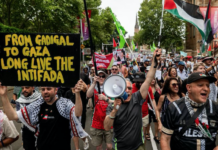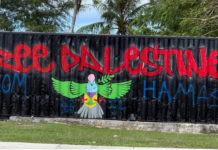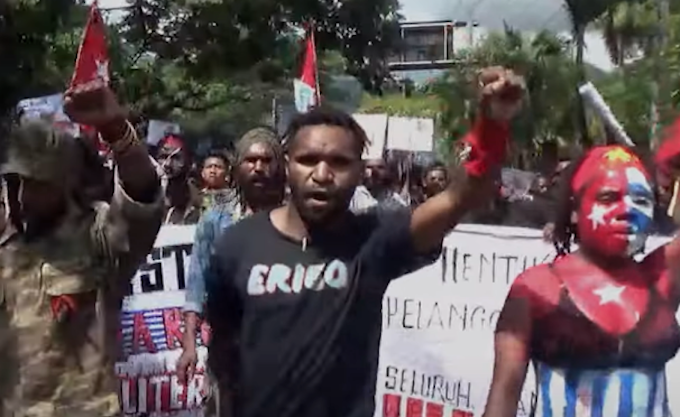
REVIEW: By ‘Alopi Latukefu
I came to this evening of short films not sure what to expect.
I have a history with West Papua (here referring to the Indonesian part of the island of New Guinea, which comprises five provinces, one named “West Papua”) from my days fronting the legendary West Papuan band Black Brothers in the early 1990s.
During that time, I was exposed to stories of struggle and pride in the identity of the people of West Papua. From their declaration of self-determination and self-government and the raising of the Morning Star flag on 1 December 1961, to the so-called “Act of Free Choice” referendum in 1969 which saw the fledgling Melanesian state become part of the larger Indonesian state, to the next 40 years of struggle.
However, apart from the occasional ABC or SBS news story and the 1963 ethnographic film Dead Birds, I hadn’t seen much footage on West Papua until now.
The West Papua Mini Film Festival is a touring festival of short films organised by the West Papuan community and their allies and supporters in Australia to raise awareness of the situation in West Papua.
The four films I saw, at the first screening in Sydney, were:
My Name is Pengungsi (Refugee)
Pepera 1969, A Democratic Integration?
Papuan Hip-Hop: When the Microphone Talks
Black Pearl and General of the Field
The first two films were quite harrowing portrayals of internal displacement and coercion in West Papua. My Name is Pengungsi (Refugee) follows the lives and families of two children, both named “refugee”, born and currently being raised in parts of West Papua distant from their families’ places of origin.
Their displacement is clearly correlated with the increased presence of extractive corporate interests backed in and supported by a military presence.
In both children’s cases this has been enabled by the gradual breaking up of the region of West Papua into first two, and now five, separate provinces.
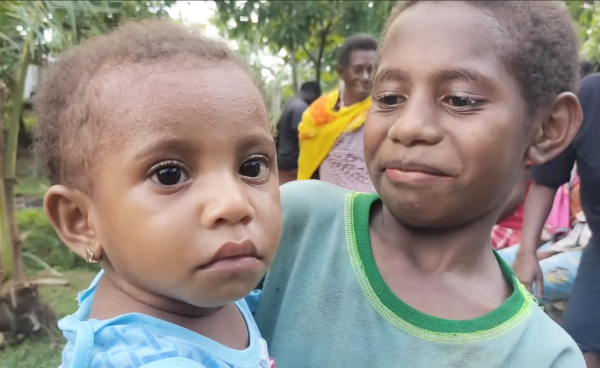 A scene from My Name is Pengungsi (Refugee)
A scene from My Name is Pengungsi (Refugee)
My Name is Pengungsi (Refugee). Video trailer: Jubi TV
The second film, Pepera 1969, A Democratic Integration, deals with the history of oppression and coercion under Indonesian rule and the absurdity of the rubber-stamping process undertaken by Indonesia (the Act of Free Choice, the Indonesian acronym for which is Pepera) which enabled it to annex West Papua under the impotent gaze of the United Nations and the complicit support of countries including the US and Australia.
The film documents the process leading into decolonisation and West Papua’s short-lived period of self-rule.
The second two films were insightful celebrations of Papuan identity in the arts, through hip-hop artists like Ukam Maran and the earlier musical group Mambesak, and in sport, with the incredible story of the Persipura football club of Jayapura.
The latter’s achievements as a football team and subsequent discrimination and suppression in the racially charged Indonesian football league provide an allegory of West Papuan identity.
In both cases, the strength and resilience of West Papuan identity, and West Papuans’ pride in their ancient ties to land and culture, are palpable.
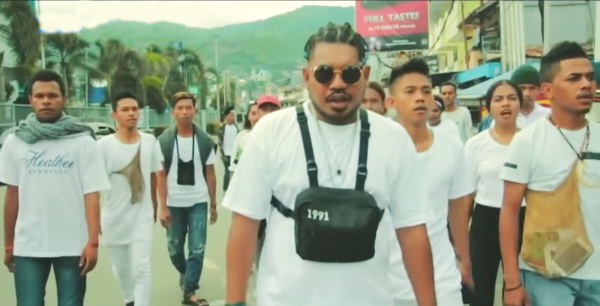 A scene from Papua Hip-Hop: When the microphone talks.
A scene from Papua Hip-Hop: When the microphone talks.
What I liked about the four films was that they presented a montage of West Papua from rural to urban, from the everyday life of internally displaced people to the exciting work of hip-hop artists with their songs of protest; from the big picture and history of West Papua to the smaller microcosm of the Persipura football team and supporters.
All in all, I was surprised how much I came out of the festival better informed about a place, its history and current developments. And this despite having the privilege of knowing more about West Papua than many Australians.
For those who don’t know much about West Papua and would like to know more, attending the West Papua Mini Film Festival is a must. It is on at various locations around Australia until 21 April 2024, with details here.
And to end on a happy note, my evening of film appreciation included meeting one of the festival’s organisers, Victor Mambor. Victor is the nephew of the late Steve Mambor, drummer for the Black Brothers!
- West Papua Mini Film Festival 2024, 9-21 April 2024, Wollongong, Sydney, Canberra, Adelaide, Brisbane, Lismore, Hobart, Melbourne, and Darwin.
- The films are also available to view with English and Indonesian subtitles on the Jubi TV Youtube channel.
‘Alopi Latukefu is the director of the Edmund Rice Centre. He previously worked for the Australian Department of Foreign Affairs and Trade. This review was first published on ANU Development Policy Centre’s DevPolicyBlog and is republished here under Creative Commons.



























